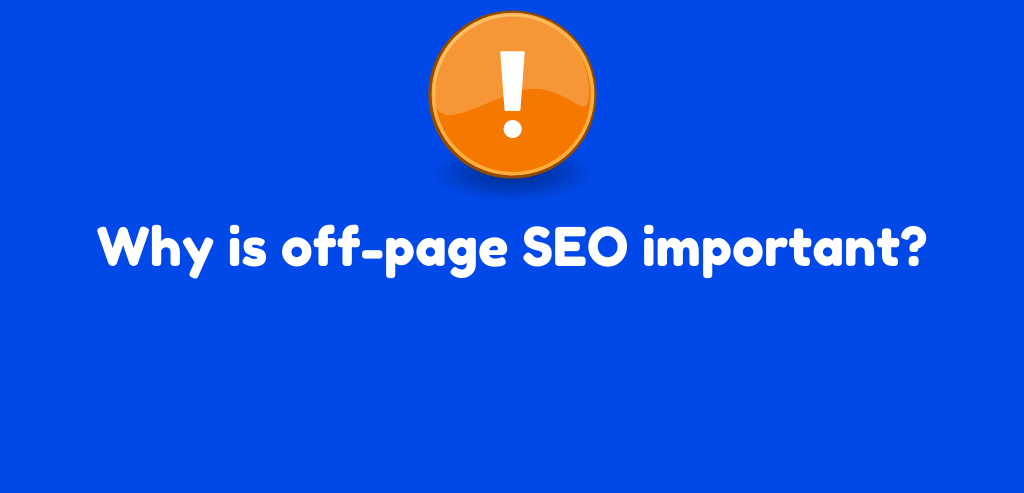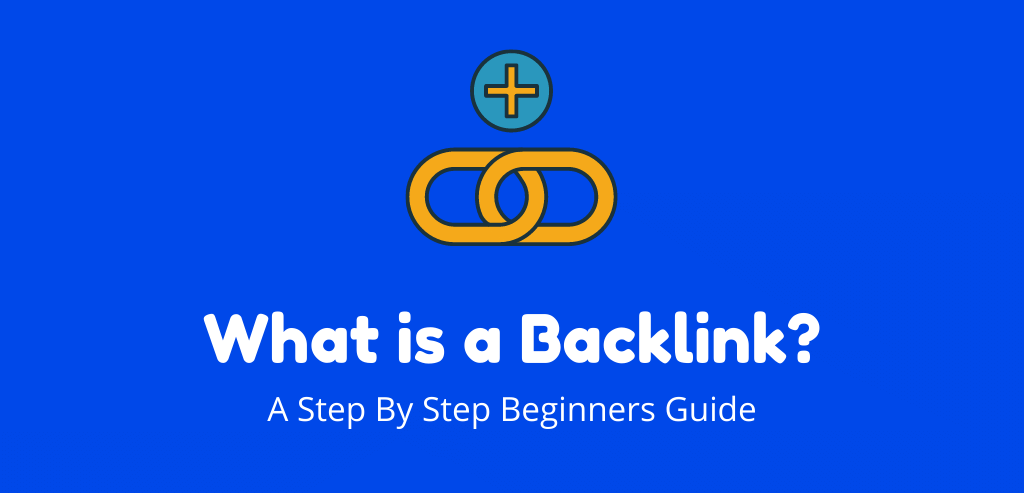
Off-page SEO, also known as off-site SEO, defines optimization methods that you can use to improve your position on websites with online search engine results (SERPs). However, these strategies occur outside your website and include web links from various other websites, social sharing, and discussions across the Internet.
The foundation for an effective SEO campaign is the off-page optimization process. By making sure that your website’s content and structure are optimized, you’ll have a better chance of ranking higher in search engine results pages (SERPs). In addition, the more keywords used on each web page can help drive traffic from organic searches by giving users suggestions about what they might be looking for online when their intent isn’t clear yet or has already been filled elsewhere!
Why is off-page SEO important?
Internet search engines have been trying for years to deliver the best results to the searcher.

To do this, they consider a variety of SEO variables on the page (defined below).
Off-page SEO indicates how the world (various other websites and individuals) views your website.
A website of the highest quality and value will most likely contain references (backlinks). In addition, it is most likely that brand name discussions will occur on social media websites (Facebook, Tweets, Pins, etc.). And it’s more likely to be bookmarked and shared between sections of similar people.
These signals give an online search engine a thumbs up to rank a more critical website to results.
Off-page SEO benefits
An effective off-page SEO methodology will surely provide website owners with the benefits of compliance:

Boost in Positions: This is one of the main advantages of off-page SEO. The site will certainly do better in the SERPs, indicating even more web traffic.
PageRank Increase: The PageRank is a number between ten that shows the importance of a website. Google is the Google.
It’s the system created by Larry Page and Sergey Brin (Google owners). The factors ultimately made Google so effective in showing the searcher one of the most relevant results.
The current ranking of websites is just one of the more than 200 ranking factors that Google uses to rate websites.
Greater direct exposure: Higher positions also indicate a better immediate direction than placing a website in the top rankings: it gets even more web links, more checkouts, and many more social networks. It looks like an endless series of occasions where one thing does one more and then another.
Developing Trustworthiness: As an extension of the above, Google recently introduced the Principle of Expertise, Authority, and Trustworthiness (E-A-T), which plays an essential role in positions and deals directly with off-page SEO.
Google wants to evaluate websites that show know-how and authority on a topic. One method to ensure that the websites obtained from the formulas can trust is the number and type of web links received.
Types of Links for Off-Page SEO
Hyperlinks are an essential element of off-page SEO. However, before you begin creating or getting backlinks, you first need to understand the different types of weblinks and the factors that affect the fairness of a web link to your website.

The three types of web links consist of:
Natural connections
A natural weblink usually relates to your website.
Your group does not engage in any activity or contact to receive the web link. Instead, the person creates the content designed to link to your web content, whether it follows your brand name or uses search to reveal your content.
Regardless, they have found your web content worth and essential highlights.
A created weblink refers to your website out of reach.
Your group got this weblink through connecting to writers, web designers, or reporters. You may also have promoted the content with an advertising campaign to get it out there and help individuals discover the content.
Even though you developed this web link, you have nonetheless created actionable content for individuals.
Links created
A developed web link affects your website based on self-submissions to directory pages, online forums, or press releases.
Your group created this web link in a targeted manner without contacting you. Let search engines look down on this type of web link structure strategy. This off-page SEO method for web link structure tends to sign up as a black hat SEO technique.
When developing web links, focus on natural or constructed web links.
How to do off-page SEO for your SEO campaign
Since we have developed how important off-page SEO is to the success of a website, we can examine the specifics of how off-page SEO can improve.

Link building
One of the most preferred off-page SEO strategies is backlinking, creating utterly natural web links to your website.
Getting reputable websites to connect to your Internet site has two main advantages: it allows you to drive web traffic to your website and identify your ranking. Therefore, hyperlinks from trusted websites are highly beneficial to your website.
Because web links are the primary method of surfing the Internet, these benefits occur. Hyperlinks improve the customer experience. Weblinks allow your customers to quickly search through various other details that they find relevant.
Hyperlinks are also the most basic measure of competency, authority, and reliability. For this reason, Google consists of web links as part of search ranking factors.
How do you convince others to bond with you?
You can try any (or all) of the off-page SEO methods to start.
Register with an organization: This could be a regional chamber of commerce market organization. Make sure your company receives a web link on the company’s website.
Create high-quality web content: High-quality posts, infographics, video clips, and much more are great ways to attract clicks and natural web links to your website. If it’s fascinating, they will surely come.
Linking: If you approach reporters and blog writers as potential resources for their writing or inquire about hosting something you’ve produced, you will have the option of creating web links to your website in the future.
Would you please share on social media websites that promoting your web content on social networks can help get it under control? Blog post web content such as infographics, articles, and more on social media site networks. Also, maximize your blog posts for discoverability by using hashtags on Twitter.
Some web links carry even more weight than others.
Weblinks from influencers in your target market have much more authority than web links from spam websites.
These premium web links will let Google know that you’ve confirmed that your website understands the product, and Google is sure to get you moving.
Check your backlinks regularly to ensure your off-page SEO method is working well. You can use devices to evaluate your and your competitors’ backlink accounts.
Some of our favorite backlinks are:
- Ahrefs.
- Moz Link Explorer.
- SEMrush.
- Buzzsumo.
- Ubersuggest.
When performing your off-page SEO technique, don’t think about how you are developing web links. Know why you are constructing it. You will make them have a much larger existence and get to people you think your articles and solutions will be helpful.
What is content off-page SEO?
You might have the best off-page strategies globally, but they won’t give a point if you don’t have quality content. Customers nurture web content on the website, and if it doesn’t apply to your target market, it won’t persist.
You could create excellent web traffic offers with good links, but that traffic will never convert into conversions if there is absolutely nothing on your website. You encourage your target market to get all the answers in your content!
If we continue with the wedding reception example, your web content is wedding reception food. It is what will keep your visitors going to completion.
Write blog
Writing blogs is a great way to create linkable content for your brand name.
Nothing on the Internet contains a continuous stream of long-form web content other than blog pages.
Your target market can comment on and share your web content on your blog site, making it much easier to get observations and create very natural web links and brand name discussions.
The ongoing articles will help you become a well-informed leader. Your target market will surely reach out to you first for details on the latest updates and samples, brief instructional articles, and how-to guides.
Advertising on social networks
While social weblinks don’t affect ranking, social network sites are still some of the best places on the Internet for understanding your brand name.
Brand names with a solid existence on social media websites feel friendly and open, vital for businesses today.
If a brand name isn’t comfortably friendly, it doesn’t just look uncomfortable. In addition, reliability is a concern when customers cannot access information quickly.
Like a convenient community grocery store, don’t make your brand name look like an uninvolved business.
You can do this by staying energetic on social networking sites and starting a blog site that can help your target market get a feel for your brand name’s flair.
Create pertinent and straightforward content to review and respond positively and sincerely to comments on both your blog site and social media websites. When you do this, your brand name will appear like a team of individuals rather than robots.
Influencer advertising
Numerous people often create web links to target off-page SEO because they focus on web links to achieve off-page SEO.
However, the fundamental goal of off-page SEO is to improve its ranking to ensure that individuals can find it. So get in touch with you and buy from you. Off-page SEO will indeed develop a beneficial interaction with your brand name. Whether via web links, testimonials, social media websites, or brand names.
However, off-page SEO can be tricky because these techniques cannot manage. Not without considering the black hat, and nobody wants to put on a black hat.
There is no safer way to lose your brand name – or ranking – than with black hat SEO techniques. For example, you might want to pay employees to upload cheap reviews or get web links to your website.
Nor can you regulate off-page SEO the way you can control the on-page aspects of your website. As a result, off-page SEO can become an irritating waiting game where all you can hope for is that it will explain your target market’s reaction.
Review your SEO technique if it is inconvenient. See what works, change what doesn’t.
Some of the methods you can use to deal with unfavorable reviews include:
Implementing changes that will surely solve the legitimate problems of those negative testimonials
Reach your consumers and request a testimonial after an acquisition.
By highlighting these 2 points, you will improve your solutions and elements and create even more reviews.
Get influencers on the Internet. Having someone make your brand name famous improves your target market’s trust fund like nothing else.
Social bookmarking
Social bookmarking is submitting your content to websites like StumbleUpon, Tumblr, Reddit, and others. These websites sector their web content to interest-specific niches that you can use to get consumers interested in the detailed demographics you want to target. However, before you send any content, you should research each website’s target markets and policies.
You don’t want to send these neighborhoods as spam. Instead, you intend to use the actual value of your content.
On-page SEO vs. off-page SEO
You have complete control over on-page SEO, while off-page SEO isn’t always.
If I get out and ask someone to contact me, that’s off-page SEO. But, on the other hand, if I increase my website rate by enhancing some photos. Then that’s on-page SEO, as I made this adjustment right on my website.
If you have ever been at a loss as to which “bucket”, an SEO method falls under, ask yourself whether it is entirely your control. It is most likely an off-page SEO strategy if the solution is no.
Off-page SEO can seem more complex than on-page SEO because some off-page aspects are not entirely under your control. However, that is the genuine factor. The more difficult it is to do something, the more serious it is as a ranking variable.
Conclusion
So, what is off-page SEO? Off-page SEO ranking factors are the elements that influence a site’s position in search engine results pages (SERPs) that aren’t related to on-page optimization. There are many different off-page SEO ranking factors, but some of the most important ones include links, citations, and social media signals. To improve your site’s ranking with off-page SEO techniques, you need to focus on building high-quality links from authoritative websites, increasing your number of citations, and getting more social shares for your content. Leave a comment below and let us know how you plan to improve your site’s ranking with off-page SEO!






